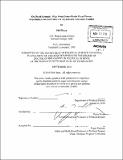On death ground : why weak states resist great powers explaining coercion failure in asymmetric interstate conflict
Author(s)
Haun, Phil M
DownloadFull printable version (31.38Mb)
Other Contributors
Massachusetts Institute of Technology. Dept. of Political Science.
Advisor
Barry Posen.
Terms of use
Metadata
Show full item recordAbstract
Great Powers often adopt coercive strategies, threatening or using limited force to convince weak states to comply with their demands. While coercive strategies have succeeded in just over half of asymmetric crises since World War I, there remain a number of cases in which weak states have chosen to resist. With their tremendous military advantage, why is it that Great Powers so often fail to coerce weak states? While a high probability of victory in war gives them the leverage to make high level demands of a weak target, concession to such demands can threaten the very survival of the weaker state, its regime, or its regime leadership. Perceiving its survival to be threatened at any level, a target will likely resist, so long as it has the means to do so. Commitment problems have also been cited as an explanation for why states cannot reach peaceful agreements. Yet Great Powers have, in fact, largely been able to overcome commitment issues in asymmetric conflicts by forming coalitions, by involving third party Great Powers in negotiations, making incremental tit-for-tat concessions, and taking diplomatic measures to reduce the target's audience costs. Finally, externalities such as international norms against invading a sovereign state without first seeking resolution through the United Nations have increased the costs to a Great Power for employing a brute force war strategy. In such cases, in fact, a Great Power may first choose a coercive strategy designed to fail in order to obtain justification for its preferred strategy of war. To reach these conclusions, I introduce a game theoretic model for asymmetric coercion, calculate equilibrium conditions, and formulate hypotheses for coercion failure based on survival and commitment issues. I create a data set of 116 asymmetric cases from 1918 to 2003 and then conduct ordered probit regressions to test predictions of survival and commitment hypotheses. I then conduct extensive qualitative case studies from the recent asymmetric conflicts between the United States and the states of Iraq. Serbia, and Libya.
Description
Thesis (Ph. D.)--Massachusetts Institute of Technology, Dept. of Political Science, 2010. Cataloged from PDF version of thesis. Includes bibliographical references (v. 2, p. 481-498 ).
Date issued
2010Department
Massachusetts Institute of Technology. Department of Political SciencePublisher
Massachusetts Institute of Technology
Keywords
Political Science.